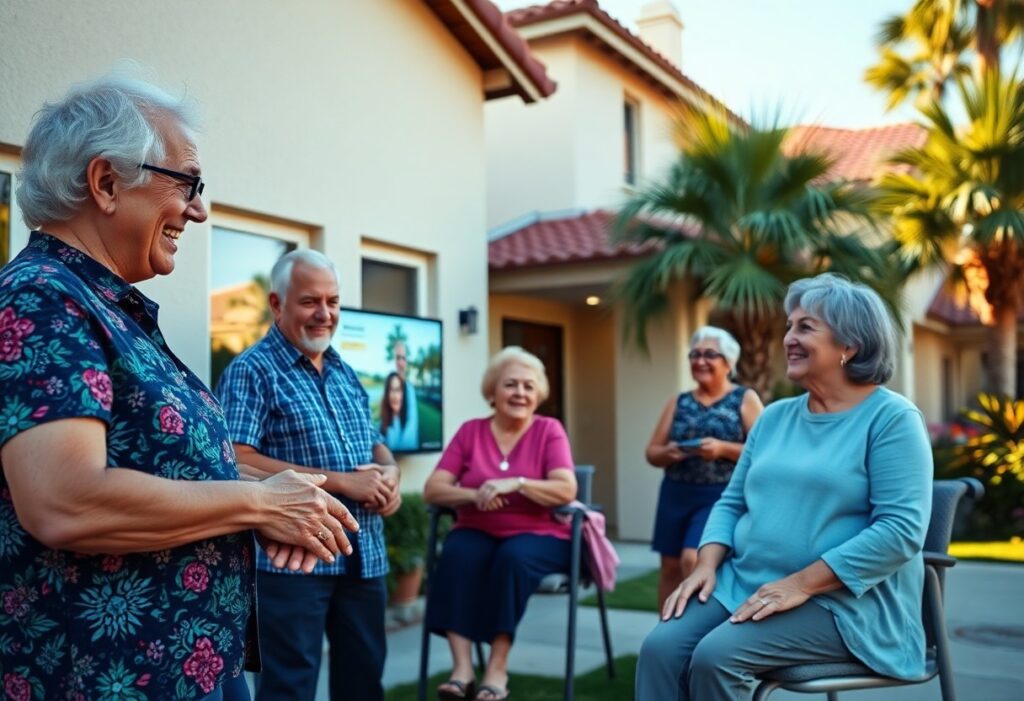Why having a strong online presence is crucial for senior care homes
Increased visibility and reach
Having a strong online presence for senior care homes is crucial in today’s digital age. With the majority of people turning to the internet to search for products and services, it is essential for senior care homes to establish a strong online presence to increase their visibility and reach. By having a website and social media profiles, senior care homes can easily be found by potential residents and their families when they are searching for care options.
One of the main benefits of having a strong online presence is the increased visibility it provides. When a senior care home has a well-designed website and active social media profiles, it becomes easier for potential residents and their families to find them. This increased visibility helps senior care homes stand out among their competitors and ensures that they are discovered by those who are actively searching for their services.
Moreover, having a strong online presence allows senior care homes to reach a wider audience. By utilizing search engine optimization (SEO) techniques and online marketing strategies, senior care homes can attract individuals from different geographic areas and demographics. This broader reach increases the chances of receiving more inquiries and ultimately leads to a higher occupancy rate for the care home.
Evidencing credibility and professionalism
Another reason why having a strong online presence is crucial for senior care homes is the ability to evidence credibility and professionalism. In the senior care industry, trust is a paramount factor that influences the decision-making process for families seeking care options for their loved ones. By establishing a reputable online presence, senior care homes can demonstrate their commitment to providing quality care and showcase their accreditations and certifications.
Through a well-designed website, senior care homes can provide detailed information about their facility, including staff qualifications, available amenities, and testimonials from satisfied residents and their families. Additionally, senior care homes can create informative blog posts or articles that address common concerns and questions in the industry, positioning themselves as knowledgeable, trustworthy experts.
Building a strong online community
Building a strong online community is another significant advantage of having a robust online presence for senior care homes. Through social media platforms and online forums, care homes can engage with their audience, share valuable content, and foster connections with residents, families, and even potential employees.
By actively participating in online conversations and responding to comments and inquiries, senior care homes can establish meaningful relationships with individuals who are interested in their services. This engagement not only helps in building a positive reputation but also allows care homes to gain valuable feedback and insights from their audience, enabling them to continuously improve their services and meet the needs of their residents more effectively.
Overall, having a strong online presence is crucial for senior care homes to increase visibility, evidence credibility, and build a thriving online community. By embracing digital channels, senior care homes can connect with potential residents and their families, showcase their professionalism, and ultimately boost resident inquiries and occupancy rates.
Creating an informative and user-friendly website
Design an Intuitive Navigation System
When creating a senior care home website, it’s crucial to prioritize user experience and make it easy for visitors to navigate through your pages. An intuitive navigation system helps users find the information they need efficiently. Ensure that your menu is prominently displayed at the top of the page and includes clear and concise labels for each category. Consider using drop-down menus or a hamburger menu for mobile devices to save space. Additionally, include a search bar on all pages to allow users to quickly search for specific information.
Organize Content with Clear Hierarchy
To enhance the usability of your website, organize your content in a clear hierarchy. Use headings and subheadings to break up text and make it easier to scan. This is especially important for seniors who may have difficulty reading small or dense blocks of text. By using descriptive headings, you can guide users to the sections that are most relevant to their needs. In addition, consider using bullet points or numbered lists to present information in a concise and easy-to-digest format.
Optimize Website Loading Speed
In today’s fast-paced digital world, users expect websites to load quickly. A slow-loading website not only frustrates visitors but may also negatively impact your search engine rankings. To optimize your website’s loading speed, compress images and videos to reduce file sizes without sacrificing quality. Minify CSS and JavaScript files to eliminate unnecessary code. Utilize caching techniques to store static resources and reduce server requests. By implementing these optimizations, you can ensure that your senior care home website loads swiftly and keeps users engaged.
Remember, creating an informative and user-friendly website is essential for boosting resident inquiries. Incorporate these tips into your website design process, and continually monitor user feedback to further refine and improve the overall user experience.
Leveraging search engine optimization (SEO) techniques
Optimizing On-Page Elements
To boost your senior care home’s online visibility, it is vital to leverage search engine optimization (SEO) techniques. Start by optimizing the on-page elements of your website. This involves strategically placing relevant keywords throughout your website’s content, meta tags, headings, and image alt text. When search engines crawl your website, they analyze these elements to determine its relevance to users’ search queries.
Creating High-Quality Content
One of the most effective ways to improve your website’s search engine rankings is by consistently creating high-quality, informative content. Develop articles, blog posts, and FAQs that address common questions and concerns of potential residents and their families. By providing valuable insights and useful information, you establish your senior care home as an authority in the industry, which can lead to higher search engine rankings and increased organic traffic.
When creating content, remember to incorporate relevant keywords naturally within the text. Keyword stuffing should be avoided, as search engines prioritize user experience. Instead, focus on producing engaging, well-written content that resonates with your target audience. Consider utilizing internal links to connect related articles and create a user-friendly browsing experience. Additionally, include hyperlinks to reputable external resources whenever applicable, as this can further enhance the value and credibility of your content.
Building Quality Backlinks
Another essential aspect of SEO is building quality backlinks to your senior care home’s website. Backlinks are links from other websites that direct users to your site. Search engines consider backlinks as an indication of your website’s authority and relevance. Aim to obtain backlinks from reputable websites in the senior care or healthcare industry.
To start building backlinks, consider reaching out to local directories and industry-specific websites to request inclusion of your website’s link. Collaborate with relevant businesses or organizations in your area to exchange guest blog posts or other forms of content promotion. Additionally, actively engage on social media platforms to share your content and attract attention from influencers who may be interested in linking to your website.
Remember, it is important to prioritize quality over quantity when it comes to building backlinks. Focus on acquiring links from authoritative sources that are relevant to your target audience.
Utilizing social media platforms to reach potential residents
Choosing the Right Social Media Platforms
In today’s digital age, utilizing social media platforms is crucial in reaching potential residents for your senior care home. However, it’s important to choose the right platforms that align with your target audience and business goals. Facebook, Instagram, and LinkedIn are popular choices for reaching potential residents.
– Facebook is the largest social media platform and offers a wide range of features to connect with potential residents and their families. Create a dedicated Facebook page for your senior care home and regularly share engaging content, such as photos, videos, and testimonials, to showcase your facility and services.
– Instagram is a visually-oriented platform that can be particularly effective when targeting younger potential residents or their adult children. Share high-quality photos and short videos that highlight the comfortable living spaces, recreational activities, and the caring environment your senior care home provides.
– LinkedIn is a professional networking platform that can be useful for reaching potential residents who may be seeking senior care options for themselves or for their loved ones. Create a compelling company page, share informative articles, and engage with relevant industry professionals to establish your senior care home as a reputable and trusted choice.
Creating Engaging Content
Once you’ve chosen the appropriate social media platforms, it’s essential to create engaging content that resonates with your target audience. Here are some tips to help you get started:
– Use high-quality visuals: Share beautiful images of your facility, staff, and happy residents engaging in various activities. Visuals can be powerful tools in capturing the attention and interest of potential residents and their families.
– Share resident success stories: Highlight individual success stories from your current residents. Showcase their achievements, experiences, and positive impact your senior care home has had on their lives. Personal testimonials can be incredibly persuasive and create an emotional connection with potential residents.
– Educate and inform: Provide informative content related to senior living, health, wellness, and caregiving. This can include blog articles, infographics, or videos that offer valuable insights and tips for seniors and their families.
Engaging with the Community
In addition to sharing compelling content, engaging with your online community is crucial. Actively respond to comments, inquiries, and reviews on your social media platforms to show that you value feedback and are dedicated to providing excellent care. Encourage satisfied residents and their families to leave positive reviews to enhance your online reputation.
Furthermore, consider collaborating with influencers or partnering with local businesses to expand your reach. Engaging with other relevant social media pages by commenting, sharing, or tagging them in your posts can also help increase visibility and attract potential residents.
Remember, consistency is key when using social media platforms. Regularly post fresh content, respond promptly to messages, and monitor analytics to assess the effectiveness of your efforts. With a strategic approach to social media, you can effectively boost resident inquiries for your senior care home and establish a strong online presence.
Building credibility through online reviews and testimonials
Online Reviews: A Powerful Tool for Building Credibility
One of the most effective ways to build credibility for your senior care home is through online reviews. Potential residents and their families often rely on the experiences of others to make informed decisions about senior care options. Positive reviews can significantly boost your reputation and serve as powerful testimonials for the quality of care you provide.
Google My Business is a popular platform where people can leave reviews about businesses, including senior care homes. Creating a profile on Google My Business allows you to manage and respond to reviews, helping to build trust with potential residents. Encourage satisfied residents and their families to share their positive experiences by leaving reviews on your Google My Business page.
Another widely used platform for online reviews is Yelp. Yelp provides a space for individuals to share their experiences and rate different services, including senior care homes. Actively monitoring and responding to reviews on Yelp demonstrates your dedication to providing excellent care and ensures that potential residents see your commitment to their well-being.
Testimonials: Real Stories of Satisfied Residents
In addition to online reviews, incorporating testimonials from satisfied residents and their families on your website can greatly enhance your credibility. Testimonials offer personal accounts of the positive experiences individuals have had at your senior care home, giving potential residents and their families a glimpse into the level of care and support you provide.
A dedicated testimonials page on your website is an ideal place to showcase these stories. Include quotes or video testimonials, if possible, to make the testimonials more engaging and relatable. Ensure that the testimonials highlight specific aspects of your senior care home that set it apart, such as attentive staff, engaging activities, or a welcoming community.
Third-Party Review Websites: Expanding Your Credibility Reach
In addition to Google My Business and Yelp, there are several other reputable third-party review websites where you can build credibility for your senior care home. Websites like Caring.com, SeniorAdvisor, and A Place for Mom allow individuals to rate and review senior care homes, helping potential residents make informed decisions about their loved one’s care.
Creating profiles on these websites and actively monitoring and responding to reviews can significantly enhance your online reputation. Encourage satisfied residents and their families to share their experiences on these platforms, as positive reviews on third-party websites carry extra weight and legitimacy in the eyes of potential residents.







